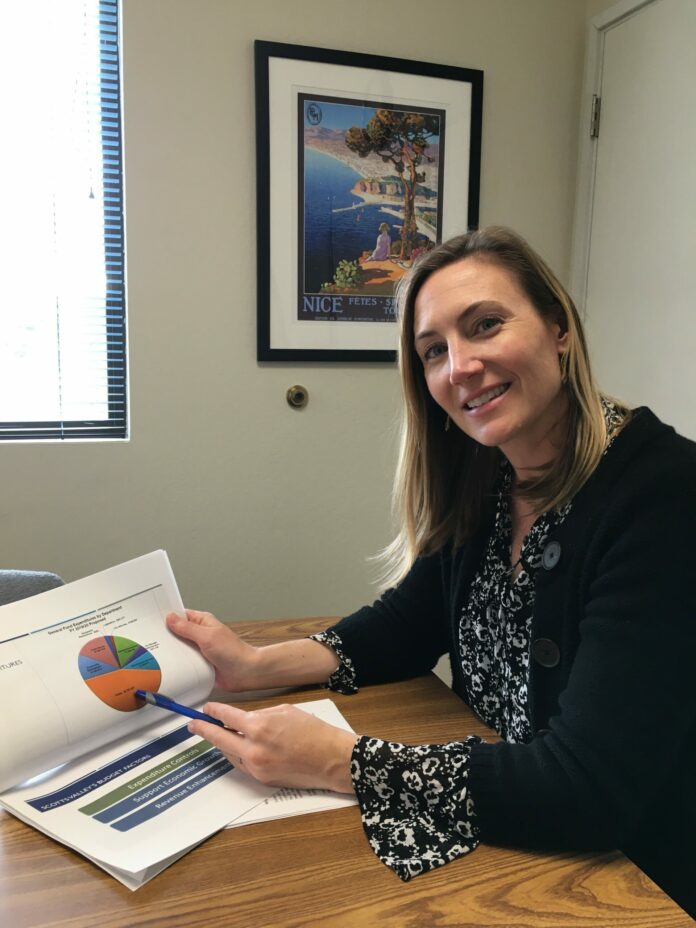As a relatively recent addition to Scotts Valley, I was quite taken aback to hear that the City of Scotts Valley has declared a fiscal emergency. Despite many new developments and a seemingly prosperous community, Scotts Valley is on a dark, tight schedule. By 2021, the city’s funds would drop below the two-month reserve level, by 2022 nothing would remain in the reserves and the city would enter debt. By 2023/2024 the deficit would reach 5.8 million dollars. If Scotts Valley’s expenditures and revenue continue without adjustments, serious service cuts will be made throughout the city, especially to the SVPD.
Fortunately, Scotts Valley already has a plan to avoid fiscal disaster. On your upcoming March ballot, you’ll be able to vote for Measure Z, an increased sales tax, to keep the city from making operational cuts. I checked in with Tina Friend, the Scotts Valley City Manager, to hear more about the situation. She summarized her hopes and concerns for the city budget, “What I know about this community is that they really care about safety and they really love their community. What’s difficult [about getting Measure Z passed] is that from the surface, the city seems to be doing so well. Our streets look great, our parks are beautiful, our police show up in two minutes. The broader community might not see the cracks in our organization, they only see the veneer. That’s our concern, are we able to educate and provide this vital information effectively before the vote?”
For those out of the know, Measure Z would repeal the current sales tax, Measure U, which is set at 0.5% of sales, and instate a new sales tax of 1.25%, for a net increase of 0.75%. If passed, Measure Z would contribute another 2 million dollars yearly to the city budget for the next twelve years, allowing the city to maintain their reserves without cutting any operations. To picture Measure Z in effect, taking your family out for a 50-dollar meal would cost 38 cents more. According to Friend, city management has been aware of their difficult fiscal situation for several years. As Friend put it, SV has been practicing “frugality by inches… We won’t fill that position, we’ll consolidate that one, we’ll cut that work, we won’t upgrade that building, we’ll let our telephone systems sit for another few years… The collective result of that is tremendous need everywhere in this organization.”
Scotts Valley has quite notably cut down on expenditures in the past year by decreasing their workforce. In 2003, 76 full time employees served the city. Now there are only 50 full time employees, all of which salaries have remained static throughout the year. Friend mused over their staffing strategy, “It’s a double-edged sword. It’s good for the bottom line, but our staff are really overburdened and can’t keep up with our needs.” When she became the City Manager seven months ago, she “stepped into a bunch of challenges… I knew the fiscal situation, and that the city had been working on it for several years before me… It’s one thing to see it and another to actually manage and organization that has very few staff, old equipment, big challenges, and no money to do it.” So, if Scotts Valley has been so conservative with their spending, why are they now in a state of fiscal emergency?
The answer comes from further studying the city’s sources of revenue. Sales tax functions as a third of Scotts Valley’s budget, which is unusual for a city of 12,000. Friend would love to draw revenue from elsewhere, particularly the property tax, but doing so “would require a constitutional amendment and changing state law… Property tax is a really low proportion of our budget. It’s higher in other cities, but we’re trapped in time… Back in 1979 when we were a relatively small, our founders wanted us to be a low tax city. So even though we’ve grown and changed, the property tax is fixed… We have a structurally underfunded budget.” With such a limited property tax, it’s no wonder Scotts Valley is struggling.
Before proposing Measure Z, Friend was considering other means of revenue, like utility taxes and hotel taxes, because sales tax “is very volatile and we’re predicting a recession in 1 to 3 years.” Although Friend acknowledged the riskier side of sales tax, she also praised its “equitability, potency, and immediacy.” Sales tax “applies to everyone who shops in Scotts Valley, not just those who live here.” It’s charged on everything, aside from food and medication, and if Measure Z passes on the March 2020 ballot, the higher sales tax could go into effect by July 1st, providing the city with a quick reprieve.
Aside from budgetary cuts, City Hall has been staying afloat by encouraging economic development and increasing the hotel tax. Friend was excited to discuss the city council’s immense dedication to economic commitment. “We’re finding a replacement for Kmart, we’ve already added two hotels, are planning a town center, updating the accessory dwelling unit program, switching over to an online permit processing program, and focusing on affordable housing as well.” After implementing these strategies, Friend looks forward to employing, “qualified people, keeping them, giving them technology that works and buildings that don’t have holes in them.”
Keep an eye out for Measure Z on the upcoming March 2020 Ballot. Even if Measure Z passes, Friend wants you to know that “[Measure Z] does not solve our problem fully. Even if it passes, we still have an artificially low budget. It is not built for a 21st century city, even a 20th century one.” For more information on Measure Z visit https://www.scottsvalley.org/DocumentCenter/View/1879/Measure-Z-FAQ. To view the official Measure Z proposal, visit https://www.votescount.com/Home/Elections/March2020PresidentialPrimary/March3localmeasures/Z-SVsalestax.aspx. If you’d be interested in a presentation with a city official for further discussion, please contact Tina Friend at tf*****@**********ey.org. If you have an opinion on Measure Z you’d like to share with our community, please send a quick blurb to pb******@*********er.com.












